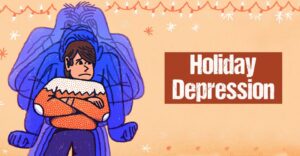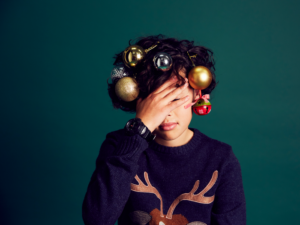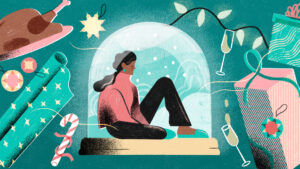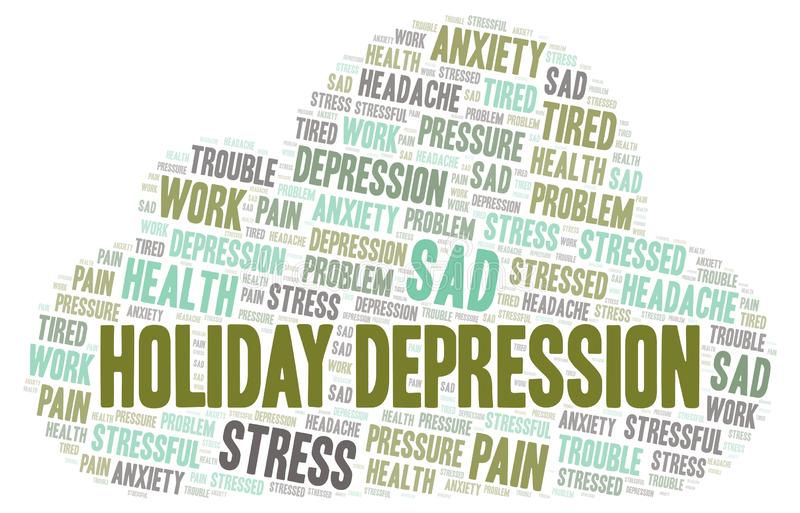The holidays are a time of joy and celebration, but for some people, they can be a time of sadness and loneliness. This is because the holidays can be a reminder of all the things that we are missing in our lives. If you are feeling down this holiday season, it is important to know how to recognize and handle holiday depression. In this blog post, we will discuss the symptoms of holiday depression and offer tips on how to deal with it.
Contents
Defining Holiday Depression
Holiday depression is a type of depression that is related to the holiday season. It can be caused by a number of factors, including the stress of holiday shopping, the lack of sunlight during winter, or the feeling of being alone during the holidays. Holiday depression is different from seasonal affective disorder (SAD), which is a type of depression that is related to the change in seasons.
It is a pre-set expectation that the holidays are supposed to be the happiest time of year. For some people, this expectation can add extra pressure and make them feel like they are not living up to the holiday ideal. This can lead to feelings of sadness and loneliness.
It must also be noted that holiday depression is not the same as having the “holiday blues.” The holiday blues are temporary and tend to go away after a few days. Holiday depression is more long-lasting and can last for weeks or even months. If you are experiencing symptoms of holiday depression, it is important to seek help from a mental health professional.
Signs And Symptoms

There are a number of symptoms that are associated with holiday depression. These symptoms include:
- feeling sad or down during the holiday season
- losing interest in activities that you used to enjoy
- difficulty concentrating
- changes in appetite or weight
- insomnia or sleeping too much
- feelings of worthlessness or hopelessness
- feeling tired or exhausted all the time
- being anxious or stressed out
- feeling hopeless or helpless
- withdraw from friends and family
Different individuals may experience different combinations of symptoms depending upon their individual conditions.
Causes
There are a number of factors that can contribute to holiday depression. These factors include:
Lack of sunlight during winter
Seasonal affective disorder (SAD) is a type of depression that is related to the change in seasons. The lack of sunlight during winter can trigger symptoms of SAD, which can moreover lead to holiday depression.
Feeling alone during the holidays
If you are not surrounded by loved ones during the holiday season, you may feel lonely and isolated. This can trigger feelings of sadness and depression. This can also arise from feelings of missing out on family gatherings or traditions. It can especially be triggering in the case of people living by themselves for school/work.
Trauma
For some people, the holidays can be a reminder of past traumas. This can include the loss of a loved one, divorce, accidents or any other type of trauma. These memories can trigger feelings of sadness and depression during the holiday season.
Unrealistic expectations about the holidays
The holidays are often portrayed as a time of joy and happiness. However, for some people, the holiday season can be a reminder of all the things that they are missing in their lives. This can lead to feelings of sadness and loneliness.
Family conflict
If you have unresolved issues with your family, the holiday season can be a trigger for depression. This is because you may be reminded of all the conflict and stress that you are dealing with in your life. It can also be difficult to be around family members if you are not getting along.
Financial difficulties
The holidays can be an expensive time of year. If you are struggling to pay for gifts or travel, it can lead to feelings of stress and anxiety. This can trigger symptoms of holiday depression. This may arise from the added financial pressure that the holidays can bring.
Grief or loss
The holidays can be a difficult time if you are grieving the loss of a loved one. This is because the holiday season can be a reminder of all that you have lost. This can trigger feelings of sadness and loneliness. It can involve feelings such as missing out on traditions or feeling isolated from loved ones.
An individual may be vulnerable to holiday depression due to one or a combination of the above factors. It is important to acknowledge these variations in people’s struggles.
Consequences

If holiday depression is left untreated, it can lead to a number of consequences. These consequences include:
- Isolation from friends and family: If you are experiencing holiday depression, you may withdraw from your friends and family. This is because you may not want to be around people. You may also isolate yourself from loved ones if you are feeling down or hopeless.
- Loss of interest in activities: Another consequence of holiday depression is that you may lose interest in activities that you used to enjoy. This is because you may not have the energy or motivation to do things. You may also find it difficult to concentrate on things that you used to enjoy.
- Difficulty functioning at work or school: Another consequence of holiday depression is difficulty functioning at work or school. This can lead to a decline in productivity and performance. It can also make it difficult to concentrate or focus on tasks.
- Poor physical health: Holiday depression can also lead to poor physical health. This is because the condition can trigger a number of physical symptoms, such as changes in appetite or weight, fatigue, and insomnia. These symptoms can have an impact on your overall physical health.
- Emotional instability: Holiday depression can also lead to emotional instability. This is because the condition can trigger a number of emotional symptoms, such as feelings of sadness, loneliness, and worthlessness. These emotions can be difficult to cope with and can lead to further instability.
- Increased risk of substance abuse: People who are struggling with holiday depression may also be at risk for substance abuse. This is because they may turn to drugs or alcohol to cope with their feelings of sadness and loneliness.
All these consequences can result in depletion of the quality of life and have negative effects on a person’s mental, emotional, as well as physical health.
Diagnosis
If you are experiencing symptoms of holiday depression, it is important to seek help from a mental health professional. They will be able to diagnose you and provide you with the necessary treatment.
The diagnosis includes a clinical interview where the mental health professional will ask you about your symptoms and how long you have been experiencing them. They will also ask about your family history, medical history, and any other relevant information.
After the diagnosis, the mental health professional will develop a treatment plan. The treatment plan may include medication, therapy, or a combination of both.
Treatment
The holidays can be a difficult time for people who are struggling with holiday depression. However, there are a number of treatment options available. With treatment, you can learn to manage your symptoms and enjoy the holiday season.
Professional Help
If you are experiencing symptoms of holiday depression, it is important to seek help from a mental health professional. There are a number of treatment options that can be effective in managing holiday depression. These treatment options include:
- Counseling: Counseling can be an effective treatment for holiday depression. This is because it can help you to identify and deal with the underlying causes of your condition. It can also help you to learn coping skills and strategies for dealing with your symptoms.
- Cognitive-behavioral therapy (CBT): This type of therapy can help you identify and change negative thinking patterns. CBT can also help you learn how to cope with stress in a healthy way.
- Interpersonal therapy (IPT): This type of therapy focuses on your relationships with others. IPT can help you identify and manage conflict in your relationships. It can also help you develop better communication skills.
- Light therapy: This type of therapy involves exposure to artificial light. Light therapy can help improve mood and relieve symptoms of SAD, which is a consequence of holiday depression.
- Support groups: Support groups can also be helpful for people who are struggling with holiday depression. This is because they can provide you with support and understanding. They can also offer you practical advice for dealing with your condition.
- Medication: In some cases, medication may be necessary to treat holiday depression. Antidepressants can be effective in managing the symptoms of depression. If you are considering medication, it is important to speak with a mental health professional about the risks and benefits.
Your healthcare provider will recommend you the most suitable type of treatment approach based on your preference as well as the severity of symptoms.
Self Coping Strategies

In addition to professional help, there are a number of self-coping strategies that can be effective in managing holiday depression. These self-coping strategies include:
- Exercise: Exercise can help improve mood and relieve symptoms of depression. It can also help to increase energy levels.
- Healthy diet: Eating a healthy diet can help improve mood and reduce symptoms of depression. A healthy diet includes plenty of fruits, vegetables, whole grains, and lean protein.
- Sleep: Getting enough sleep is important for managing holiday depression. This is because sleep can help to improve mood and reduce fatigue.
- Stress management: Stress can trigger or worsen symptoms of holiday depression. Therefore, it is important to manage stress in a healthy way. There are a number of stress management techniques that can be effective, such as relaxation techniques, exercise, and journaling.
- Avoid alcohol and drugs: Alcohol and drugs can worsen symptoms of depression. If you are struggling with holiday depression, it is important to avoid alcohol and drugs.
- Engage in activities: Doing activities that you enjoy can help to improve your mood and reduce symptoms of depression. Activities that can be helpful include reading, listening to music, spending time with friends and family, and hobbies.
- Support system: Having a support system can be helpful in managing holiday depression. A support system can include family, friends, or a support group.
- Practice gratitude: One self-coping strategy that can be effective in managing holiday depression is gratitude. This involves taking time to appreciate the good things in your life.
- Set realistic goals: It is important to set realistic goals when you are struggling with holiday depression. This is because setting unrealistic goals can lead to disappointment and further feelings of sadness and loneliness.
- Take time for yourself: It is important to take time for yourself if you are struggling with holiday depression. This means doing things that make you happy and relaxing. Try to schedule some “me time” each day.
Holiday depression is a real condition that can have serious consequences if left untreated. If you are struggling with holiday depression, it is important to seek help from a mental health professional. There are a number of treatment options that can be effective in managing your emotions.
Conclusion
To conclude the above, it can be said that holiday depression is a real condition that needs to be dealt with. If you or someone you know is struggling with holiday depression, it is important to seek help from a mental health professional. There are a number of treatment options available that can be effective in managing the symptoms of this condition.
For more information, please contact MantraCare. Depression is a mental illness characterized by persistent feelings of sadness, hopelessness, and loss of interest in daily activities. If you have any queries regarding Online Depression Counseling experienced therapists at MantraCare can help: Book a trial Depression Therapy session


